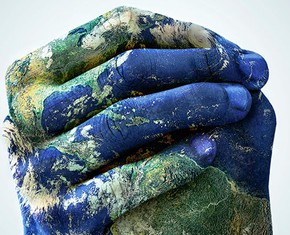The views expressed in our content reflect individual perspectives and do not represent the authoritative views of the Baha'i Faith.
Politics, by definition, means two things: governance of a country, and the hope of achieving individual or partisan power. Baha’is see these two as antithetical—like water and oil, they don’t mix well.
We need governance, so critical to the development of society and civilization—but the pursuit of power undermines and destroys such development. Pursuing political power for its own sake, rather than for the sake of the people, can cause division, anger and hatred, and often result in the worst governors and rulers, not the best. Television news demonstrates this fact every hour.
That’s just one of the reasons Baha’is avoid partisan politics:
Though loyal to their respective governments, though profoundly interested in anything that affects their security and welfare, though anxious to share in whatever promotes their best interests, the Faith with which the followers of Baha’u’llah stand identified is one which they firmly believe God has raised high above the storms, the divisions, and controversies of the political arena. Their Faith they conceive to be essentially non-political, supra-national in character, rigidly non-partisan, and entirely dissociated from nationalistic ambitions, pursuits, and purposes. Such a Faith knows no division of class or of party. It subordinates, without hesitation or equivocation, every particularistic interest, be it personal, regional, or national, to the paramount interests of humanity, firmly convinced that in a world of inter-dependent peoples and nations the advantage of the part is best to be reached by the advantage of the whole, and that no abiding benefit can be conferred upon the component parts if the general interests of the entity itself are ignored or neglected. – Shoghi Effendi, The World Order of Baha’u’llah, p. 198.
However, many, many Baha’is are public servants. I was one myself for 39 years, serving the State of New Jersey. I was first hired as a stock clerk, rose through the ranks, and tried my best to apply the Baha’i ideals of wisdom, loyalty, independence, thoughtfulness, frankness and kindness in all my dealings. I was far from perfect, but without a spirit of cooperation and reciprocity, I could not have completed any of my assigned tasks.
Consistent with the avoidance of partisan politics, Baha’is do hold appointed offices to serve humanity, but don’t hold elected ones, unless they’re strictly non-partisan. Why? Well, if you’ve been through a modern political election cycle you’ve seen the attack ads, the distortions of records, disparagements and even outright lies about opposing candidates. All of that partisan wrangling violates the Baha’i spirit of unity. In electing their own democratically-chosen administrative bodies on the local, national and international levels, Baha’is avoid campaigning, nominating and electioneering because of this very divisiveness:
Let them refrain from associating themselves, whether by word or by deed, with the political pursuits of their respective nations, with the policies of their governments and the schemes and programs of parties and factions. In such controversies they should assign no blame, take no side, further no design, and identify themselves with no system prejudicial to the best interests of that world-wide Fellowship which it is their aim to guard and foster. – Ibid., p. 64.
This stance of non-involvement in partisan politics does not mean that Baha’is, far from standing aloof from the issues surrounding the governance of their nation, fail to actively engage their fellow citizens in understanding and solving the problems of the day. Baha’is do this through discourse, a humble posture of learning and participation at all levels of society, with individuals and organizations. For example, I serve as a member of my township’s Environmental Commission, and offer my voice and vote on land use applications. That Commission, concerned with protecting the environment, also weighs the benefit or harm of new construction projects to the community.
Baha’is are also committed to global social reform. All across the world, Baha’is take part, with other progressive groups, in activities that promote the goals of peace, working for better race relations, better children’s education and better neighborhood unity.
What we see in politics today is more than unfortunate—it has become absolutely harmful to the progress of stable governments and peoples around the world. The political divisiveness and the inability to reach consensus on issues affecting millions of citizens amply demonstrate that current structures no longer work:
If long-cherished ideals and time-honored institutions, if certain social assumptions and religious formulae have ceased to promote the welfare of the generality of mankind, if they no longer minister to the needs of a continually evolving humanity, let them be swept away and relegated to the limbo of obsolescent and forgotten doctrines. Why should these, in a world subject to the immutable law of change and decay, be exempt from the deterioration that must needs overtake every human institution? For legal standards, political and economic theories are solely designed to safeguard the interests of humanity as a whole, and not humanity to be crucified for the preservation of the integrity of any particular law or doctrine. – Ibid., p. 42.
We need vast changes, the Baha’i teachings say, not only in the structure of our governmental systems, but in the hearts and minds of our local, state, national and international leaders. Baha’u’llah, who revealed new spiritual laws and systems for the benefit of humanity, has given us those changes. It’s up to us, at this point, to implement them:
It implies an organic change in the structure of present-day society, a change such as the world has not yet experienced. It constitutes a challenge, at once bold and universal, to outworn shibboleths of national creeds—creeds that have had their day and which must, in the ordinary course of events as shaped and controlled by Providence, give way to a new gospel, fundamentally different from, and infinitely superior to, what the world has already conceived. It calls for no less than the reconstruction and the demilitarization of the whole civilized world — a world organically unified in all the essential aspects of its life, its political machinery, its spiritual aspiration, its trade and finance, its script and language, and yet infinite in the diversity of the national characteristics of its federated units. – Ibid.
















Comments
Sign in or create an account
Continue with Googleor